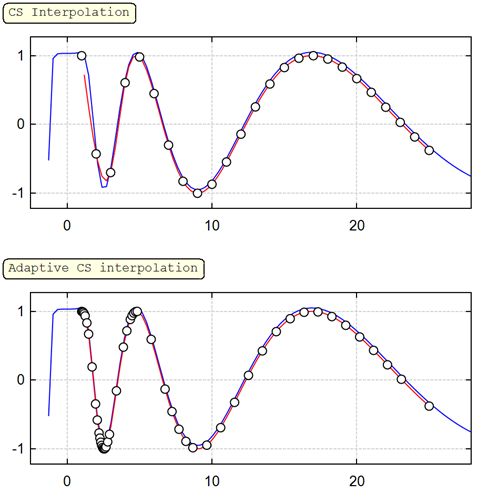CSpline interpolation - Messages
Thanks in advance.
Alvaro.
cspline test.sm (37.47 KiB) downloaded 823 time(s).
WroteHi. I have some issues in the attached.
Thanks in advance.
Alvaro.
Two red remain ... but here the XY plot.
Cheers, Jean
cspline test.sm (42.54 KiB) downloaded 874 time(s).
Best regards.
Alvaro.
Regards,
Radovan
WroteHi Jean. Thanks, but you know me ... I want to use my own function.
I messed your coding to make readable.
As it looks, you seem to implement Hermite cubic or an unknown brew ?
Hermite [the Draftsman spline] fits better in certain region,
but is discontinuous at junctions and as such has little interest.
In short, it can be used to create some additional best points
for the next more conventional l_p_c splines, for them now to
be continuous at points, thus analytical up to 2nd order derivative.
Hermite was exhausted in Mathcad, all converted Smath.
If of interest, will be please to attach.
Your original coding did calculate 'V' , but not the freaked code.
Some sort of "shadow in context".
Jean
cspline test[NFG].sm (53.23 KiB) downloaded 702 time(s).
Spline l_p_c [dspline, fintegrate].sm (78.96 KiB) downloaded 720 time(s).
Spline l_p_c [Recovered].sm (129.96 KiB) downloaded 679 time(s).
CS only do what mathcad's cspline do:

Best regards.
Alvaro.
WroteHi Jean. There are not to much shadow in that small code. It's just the implementation of the traditional spline interpolation. In SMath there are not, or I can't found, the function cspline. The interpolation with cinterp in SMath evaluates the vector V each time that you call it, it's always better to have V=cspline(X,Y) and then call interp(V,X,Y,x). Finally, I want to implement an adaptive step size for the intervals in X. But first I see very convenient to have vectorization and plotting issues solved.
CS only does what Mathcad's cspline does:
The interpolation with cinterp in SMath evaluates the vector V each time that you call it, it's always better to have V=cspline(X,Y) and then call interp(V,X,Y,x)
1. You have a good point, but invalid: cinterp(X,Y,x) works faster than Mathcad [I tested long time ago].
2. Not supporting vectorization has only one answer to me:
all that stuff is scalar wrt 'x' for the canvas plot only,
but it is NOT a real scalar function like the built-in ones ... sin(x), cos(x), exp(x) ...
3. For the adaptive step size, you may have to invent the wheel or implement
Robert A. [Lagrange quadratic knots ... stricking example attached].
Resume:
1. cinterp => hyperfast
2. Vectorization ... left unsolved
3. adaptive step size => suggested
Thanks Alvaro, most interesting ... Jean
cspline test (1).sm (62.5 KiB) downloaded 810 time(s).
Spline Lagrange [Quadratic knots EXPERIMENTAL].sm (47.95 KiB) downloaded 711 time(s).
Best regards.
Alvaro.
adapt cspline test.sm (83.25 KiB) downloaded 829 time(s).
Wrote
...
Resume:
1. cinterp => hyperfast
2. Vectorization ... left unsolved
3. adaptive step size => suggested
...
I will add this as well, if you do not mind.
Two of the main reasons we want to use interpolation (cinterp f.e.).
I think I mentioned this many times...
...
4. numerical derivation ... left unsolved
5. numerical integration => solved?
....
Regards,
Radovan
WroteI will add this as well, if you do not mind.
Two of the main reasons we want to use interpolation (cinterp f.e.).
I think I mentioned this many times...
...
4. numerical derivation ... left unsolved
5. numerical integration =
Numerical derivation from the Smath d/dx is not possible ... WHY ?
The derivative operator derives wrt to rules that apply to function(s)
cinterp(X,Y,x) is not a function, only an interpolating function.
Alternately two ways:
1. from the dspline(s,X,Y,t) ... 's' from solving
2. from the infinitesimal D1(x,h,f) ... where 'f' is cinterp(X,Y,x)
Exemplified in the attached ... Jean
Page0 Cubic Copy.sm (104.48 KiB) downloaded 938 time(s).
Best regards.
Alvaro.
di cspline test.sm (86.48 KiB) downloaded 953 time(s).
WroteDerivative and integral for regular cubic splines.
Best regards.
Alvaro.
1. Integrator does not recognize p(x)
2. D2(,x) works great.
Cheers ... Jean
di cspline test Otherwise.sm (51 KiB) downloaded 846 time(s).
di cspline test.sm (101.77 KiB) downloaded 850 time(s).
WroteDerivative and integral for regular cubic splines.
Best regards.
Alvaro.
1. I don't think you have any kind of spline for real application [added example].
2. From what I tested before Smath cinterp is universal [Matlab, Mathematica, Mathcad ...]
3. Read carefully: Smath ainterp [Akima] is unique to me to Smath.
From previous ad nauseum testing, it fits exceptionally well certain types of data
and is pure crap for other types of data, that's what it is. Superb for the example.
4. On the other hand, integrator supports cinterp, your coding does not.
The cumulative integration does between limits as well, just more greedy in time.
5. I don't understand all that crappy coding from download ... damned mystic !
All in all: most interesting. Thanks Alvaro.
di cspline test [SHORT] Copy.sm (104.62 KiB) downloaded 732 time(s).
This worksheet is about adaptive csplines and differentiation and integration of the splines.
cspline.sm (106.91 KiB) downloaded 889 time(s).
cspline.pdf (297.35 KiB) downloaded 497 time(s).

Best regards.
Alvaro.
- New Posts
- No New Posts
